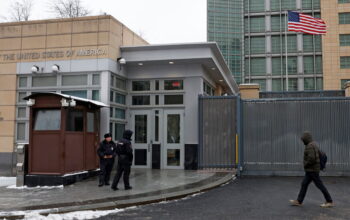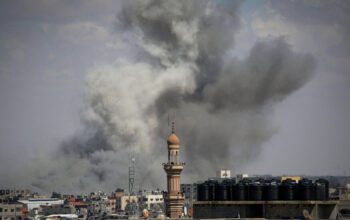
CHASIV YAR, Ukraine — Russia’s offensive in eastern Ukraine is intensifying in Donetsk Province, with a string of towns and villages coming under bombardment in the last week as Russian troops turn their firepower further west after seizing control of the last city under Ukrainian control in Luhansk Province.
For days now, the attacks have mostly seemed random and without purpose, but taken as a whole they make clear that Russia is preparing to capture another slice of Donetsk, the other province in the Donbas region.
Even as the Russia military command announced an operational pause to allow its main troop force to regroup, its forces have increased bombardment of the five main towns and cities in the area — Bakhmut, Kramatorsk, Sloviansk, Druzhkivka and Kostiantynivka — as well as surrounding villages.
Soldiers and emergency crews worked through the night to rescue people from a bombed apartment complex after a Russian strike in the village of Chasiv Yar, a dozen miles from the front line. By midday Sunday, they had pulled five people from the rubble and recovered 15 bodies, but said they feared 10 more lay beneath the crushed concrete, including a 9-year-old boy.
Four rockets slammed into the nearby town of Druzhkivka just after dawn Saturday, shaking the city, smashing windows and damaging a shopping center and other public buildings, but causing no casualties. The neighboring town of Kostiantynivka came under two cluster-bomb attacks Saturday afternoon, and Saturday evening at around 9 p.m. rockets slammed into two buildings in Chasiv Yar, including the apartment complex.
In Druzhkivka, Ukrainian soldiers were bunked down in a sports hall, and they may have been the target, but soldiers clearing up broken glass said they had escaped injury. Police officers inspecting several of the bomb sites and collecting debris said the rockets were not precision-guided munitions, so it was difficult to guess a specific target. Two landed in parks and one in a shopping center forecourt.
“It will not break Donbas,” said Yevgeny, 45, an I.T. programmer who was retrieving his car covered in dust but undamaged from a rented garage.
But many of the residents of these towns have come from settlements further east, already displaced by the war that has been raging since 2014, and they say they recognize the signs of strengthening attacks.
“It’s just the beginning,” said Lyudmyla, 61, her face pale from shock as she stared at the damage to the cultural center in Druzhkivka beside her sister Svetlana, 62.
Better Understand the Russia-Ukraine War
In Chasiv Yar, a resident, Oleksandr, 31, stood watching the rescue work at the stricken apartment complex as machines pulled away concrete slabs and emergency workers flung bricks aside. “My grandmother was here,” he said. “That’s her bed,” he added pointing to the pile of rubble. “I hope they will find her and I can give her a funeral.”
He said that about 10 civilians, mostly women on pensions, were living in the building at the time of the strike, but that members of the military had come to lodge there two days earlier. He had tried to persuade his grandmother to move to his place, he said, but she had refused.
Two soldiers who had been staying in the building were among the dead, according to another soldier who arrived with colleagues from the front line near Bakhmut to retrieve belongings. He gave only his first name, Dyma, and his age, 28, in accordance with military rules. Military vests and rucksacks and a broken rifle, covered in brick dust, lay on the ground under the trees.
July 10, 2022, 6:20 a.m. ET
He said a plane had struck the building with rockets. Aerial bombardment was the most punishing, Dyma said. A plane had dropped a parachute bomb on their positions near Bakhmut, causing devastating damage. “They do not announce it but we are taking heavy losses,” he said. “We need to close the skies,” he added, repeating a request that many Ukrainians make for planes and stronger air defense systems from Western allies to combat Russian aerial attacks.
As he spoke heavy explosions sounded in the distance, the shock wave powerful enough to rock the cars. The Russians had started their bombardment again, and judging from the distance they were hitting Kostiantynivka, Dyma said.
In that town on Saturday, three neighbors sat chatting on a bench outside the front gate in the shade. They had just eaten lunch together, and at 12:30 one of them, Oleksandra, went home to feed her dog.
At that moment their bucolic neighborhood came under attack. Cluster bombs burst overhead, exploding in the streets and gardens and over the wooden cottages, splintering trees and shattering windows and doors with lethal metal shards. Alla, whom neighbors called Auntie Alla, died in her yard, where two cluster bomblets exploded.
“Three grandmas were sitting on a bench there together, and one was killed,” Mikhail Stubin, 48, said, almost shouting in anger. His mother and mother-in-law, Alla’s friends, puttered about outside their homes, seemingly speechless.
“It was something terrifying,” said Anna Kaluzhnaya, 69. “First a whistle and then bangs so loud,” she said. Four cluster bombs exploded around her house, smashing the roof and windows on every side and shredding the plants in her garden. Metal shrapnel pierced the walls but she had prepared a small a space inside a closet and survived unharmed.
“No one expected it in this district,” she said. “I am pretty strong-blooded, but this was terrible.”
A few hours later, a second cluster-bomb attack hit the town, landing on a former metal factory that was being used as a temporary base by Ukrainian soldiers. One of the factory buildings was damaged and a fire burned through the afternoon across a large tract of land below the factory. The soldiers at the gate seemed badly rattled and asked journalists to leave.
The front line against the Russians lies more than 20 miles east of Druzhkivka and Kostiantynivka. But Ukrainian soldiers are a frequent sight in this area, driving in trucks toward the front line, shopping in local stores, and resting up in residential and government buildings where they can.
Closer to the front, there are only military vehicles on the roads, and the sounds of war are almost constant. Ukrainian artillery fires steadily from bases in and around the main towns. The smell of burning drifts in the air, and plumes of black smoke rise in several places on the horizon.
The Ukrainian police guard the last checkpoint on the edge of the town of Sloviansk, hunkered down in the woods just a few miles from the front line. Police officers edged toward their bunker midday Saturday as a Ukrainian multiple rocket launcher roared into action nearby, firing a volley toward Russian positions.
Villages beyond the checkpoint remain in Ukrainian hands but have come under blistering bombardment for weeks. Russian artillery hit the area Saturday morning, setting fire to trees and undergrowth flanking the main highway. The fields were still smoldering midday Saturday when New York Times journalists drove through.
President Vladimir V. Putin has said his aim is to bring Ukraine’s eastern provinces of Luhansk and Donetsk under Russian control. Parts of the two provinces have been under the control of pro-Russian separatists since 2014, and Russia’s invasion forces have concentrated their efforts on the remaining area since they pulled back from around Kyiv at the end of March.
Russia has announced an operational pause as its troops regroup after the intense battles for two cities to the east in Luhansk, Sievierodonetsk and Lysychansk. But Ukrainian officials and civilians said heavy fighting was continuing in the frontline villages as Russian forces pursued their push westward, and Ukrainian troops remained determined to make them fight for every inch of land.
“The Russians will not stop,” said Konstantin, 58, the former manager of a local chocolate factory. He listed on his fingers the places already destroyed in the last five months. “You saw what happened to those places. I have a friend who said his village was completely razed to the ground,” he said. “They will take all of this, too.”
Kamila Hrabchuk contributed reporting.


